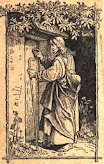Nicene Creed
We believe in one God, the Father, the Almighty,
maker of heaven and earth, and all that is seen and unseen.
We believe in one Lord, Jesus Christ,
We believe in one Lord, Jesus Christ,
the only Son of God, eternally begotten of the Father,
God from God, Light from Light,
true God from true God,
begotten, not made, one in Being with the Father.
Through Him all things were made.
For us men and for our salvation
He came down from heaven:
by the power of the Holy Spirit
He was born of the Virgin Mary,
and became man.
For our sake He was crucified under Pontius Pilate;
He suffered, died, and was buried.
On the third day He rose again
in fulfillment of the Scriptures;
He ascended into heaven
and is seated at the right hand of the Father.
He will come again in glory
to judge the living and the dead,
and His kingdom will have no end.
We believe in the Holy Spirit,
the Lord, the giver of life,
who proceeds from the Father and the Son.
With the Father and the Son
He is worshiped and glorified.
He has spoken through the Prophets.
We believe in one holy catholic and apostolic Church.
We acknowledge one baptism for the forgiveness of sins.
We look for the resurrection of the dead,
and the life of the world to come. Amen.
God from God, Light from Light,
true God from true God,
begotten, not made, one in Being with the Father.
Through Him all things were made.
For us men and for our salvation
He came down from heaven:
by the power of the Holy Spirit
He was born of the Virgin Mary,
and became man.
For our sake He was crucified under Pontius Pilate;
He suffered, died, and was buried.
On the third day He rose again
in fulfillment of the Scriptures;
He ascended into heaven
and is seated at the right hand of the Father.
He will come again in glory
to judge the living and the dead,
and His kingdom will have no end.
We believe in the Holy Spirit,
the Lord, the giver of life,
who proceeds from the Father and the Son.
With the Father and the Son
He is worshiped and glorified.
He has spoken through the Prophets.
We believe in one holy catholic and apostolic Church.
We acknowledge one baptism for the forgiveness of sins.
We look for the resurrection of the dead,
and the life of the world to come. Amen.
The Nicene Creed was originally formulated at the 1st Ecumenical Council of the Catholic Church held in Nicea in the year 325 and was later amplified, adopted and authorized as a true expression of the faith at the 2nd Ecumenical Council in Constantinople in 381.
The Nicene Creed built upon the profession of faith in the Apostles’ Creed, defending against many of the heresies of the time. The primary and most prominent was Arianism, a heresy of the 4th century that was named for its author, Arias, a priest in Alexandria. Arianism denied the full divinity of Jesus Christ and debate over his doctrine agitated the Church for more than half a century. Arias sought to safeguard the absolute transcendence of God by teaching that God is unbegotten and without beginning. The Son, because he is begotten, cannot be God in the same sense as the Father is. Arias taught that the Son was created like all other creatures and exists by the will of the Father. Although Arianism was the most troublesome heresy of the time, it was not the only one. The Nicene Creed was absolutely necessary at the time to ensure the witness of faith during that time.
One often overlooked, but nonetheless important, aspect of the Nicene Creed is that it was formulated before the Church made a determination of which books belonged in the New Testament. A list of the inspired books of the New Testament, as we have them in the Bible today, was first put together in the 39th Pastoral Letter of Saint Athanasius, Bishop of Alexandria, Egypt, in the year 367. He wanted a list of sacred books of the New Testament, listing the 27 books of the New Testament and declaring that all are apostolic and canonical. Saint Athanasius said, “In these alone is proclaimed the Good News of the teaching of true religion.” This list was confirmed by the Councils of Hippo (393) and Carthage (397). In 405, Pope Innocent I, responding to a question as to what formed the canon, provided this list as well.
Finally, the Council of Trent, meeting in 1545-1563, again promulgated the same list. Because the Nicene Creed was formulated to express the doctrines of the Christianity and to serve as a test of orthodox teaching, the Nicene Creed was, by nature, influential in compiling the New Testament.
Gradually the Nicene Creed came to be recognized as the proper profession of faith for candidates for the Sacrament of Baptism. It is the profession of the Christian Faith common to the Catholic Church, to all the Eastern Churches separated from Rome, and to many of the Protestant denominations today.















